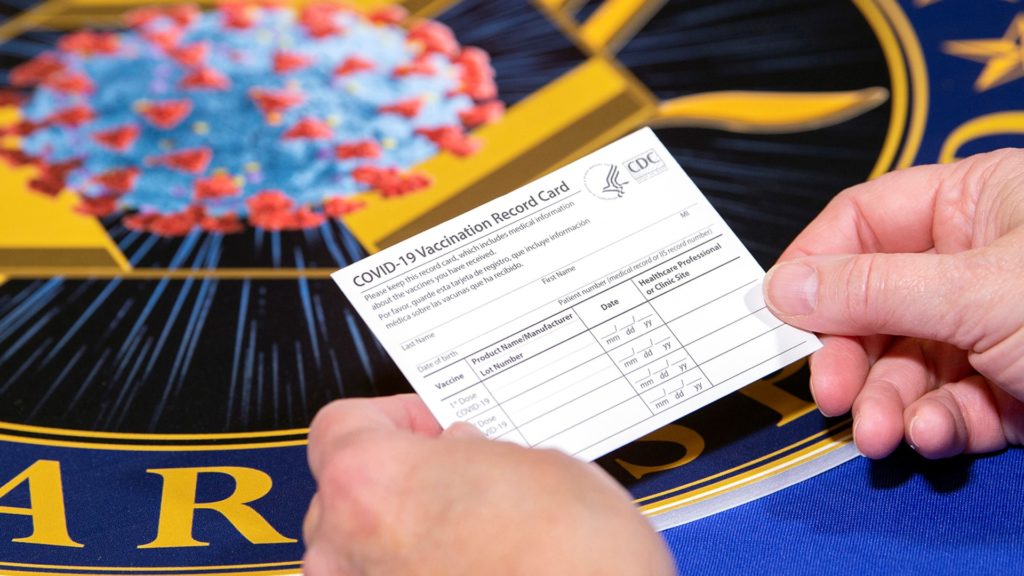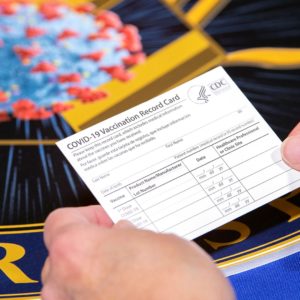A CNN report on the Department of Defense’s aggressive plan for distributing COVID-19 vaccines included a photo of a little-known aspect: the vaccination card.
According to the report, vaccination cards are intended to be the “simplest” way to keep track of COVID-19 shots for a vaccine that requires multiple doses.
“For most COVID-19 vaccine products, two doses of vaccine, separated by 21 or 28 days, will be needed,” according to the Centers for Disease Control and Prevention. “Second-dose reminders for vaccine recipients will be critical to ensure compliance with vaccine dosing intervals and achieve optimal vaccine effectiveness.”

Every dose administered will be reported to the CDC, said Claire Hannan, executive director of the Association of Immunization Managers. And vaccination clinics will also keep a record of who got what dose, so that way you’re not getting the second dose of a vaccine before you got the first.
Not to mention that every shot given in the Granite State will be tracked by the New Hampshire Department of Health and Human Services (DHHS).
“We currently have a process in place for providers to be able to order vaccines and track the vaccine status of their patients,” said Jake Leon, communications director for the Department of Health and Human Services told NHPR. “The registry will support the current process and the efforts by DHHS and healthcare providers to notify patients when their second dose is due.”
The question some are asking is, what will states like New Hampshire do with that? Will the vaccination card become a tool for public health policy, used to restrict the activities of non-card-carrying citizens?
It’s not a new idea. In March, New York Gov. Andrew Cuomo (D) proposed a reopening strategy for his state that included antibody testing results. “Younger people can go back to work… people who can get this antibody tests — show they have had the virus and resolved — can go back to work,” Cuomo said.
A few weeks later, America’s COVID czar Dr. Anthony Fauci said he was open to the idea as well: “It’s one of those things that we talk about when we want to make sure that we know who the vulnerable people are and not,” he said
Will New Hampshire use vaccine records, like the vaccination cards, to restrict access to government buildings or as a requirement to visit a long-term care facility? Will private businesses be allowed to request these records from customers or deny services?
It’s hardly a stretch. Gov. Chris Sununu has already ordered every restaurant to collect contact information on its dine-in customers. Why not a scan of their vaccination cards? And what happens when restaurants start marketing “All our employees have their vaccines — dine safely here!”? Or when a business hangs up a sign that reads “No Shirt, No Shoes, No Shots — No Service?”
The N.H. DHHS declined repeated requests for comment on this story.
In Kentucky, Public Health Commissioner Dr. Steven Stack explained to state residents on Wednesday that receiving the vaccine would put them on the National Immuno Registry. “The federal government is going to provide vaccination cards that we will provide for people when they get a vaccine,” Stack said. “I don’t want to minimize this. This, and other parts of this, are just parts of what makes this a complex undertaking.”
On Thursday, Sununu said the general population in New Hampshire wouldn’t likely begin receiving vaccines until March or April. It will take months longer before immunization levels reach some equivalency of herd immunity.
“And we’re not mandating it. We are not mandating a vaccine at the state level, but I think we’re going to see a high demand for it based on its efficacy,” Sununu said.
In the meantime, vaccination cards or “immunization passports” could become part of the conversation.
In May, electronic health records company EPIC said it was looking into developing a phone app that will say “whether you are tested and you’re clear, whether you are currently not safe, whether you have COVID right now.” According to CEO Judy Faulkner, it would show red for someone who has COVID-19, green for someone who’s clear and yellow if the status is unknown.
Noah Rothman of Commentary Magazine has been covering the “Immunity Caste” issue for months. “There needs to be legislation barring private interests from using this [vaccination cards] to de facto stratify society and it needs to be done now,” he said Friday.

